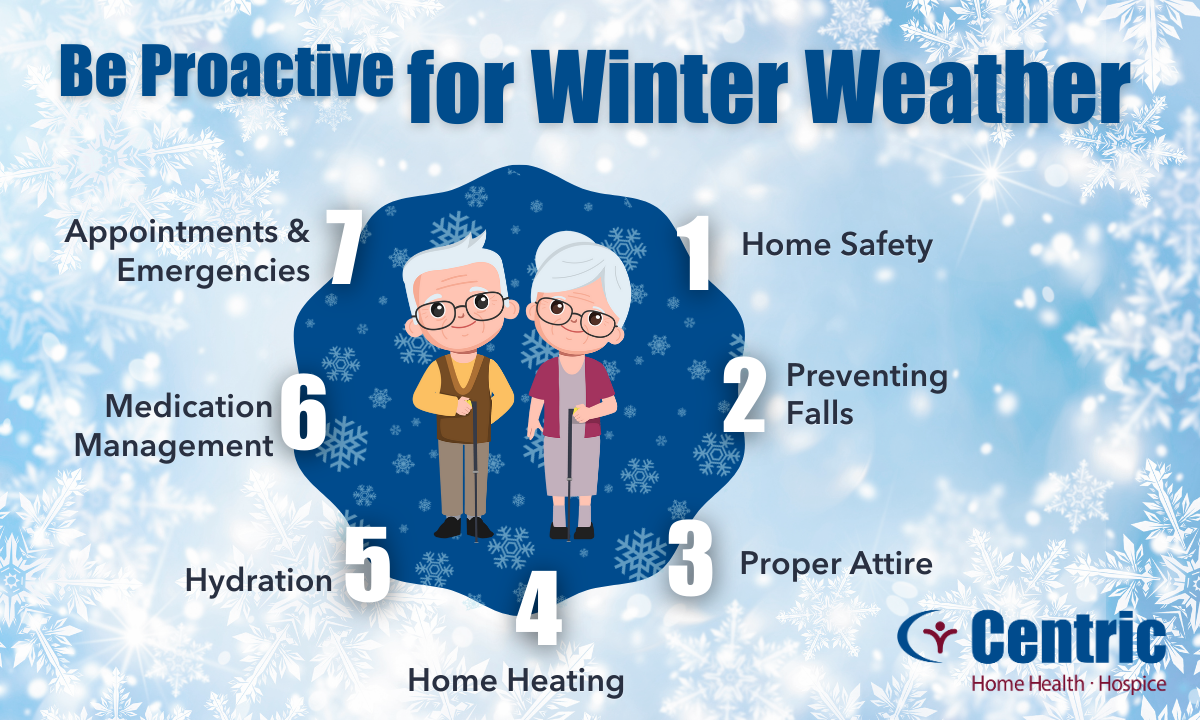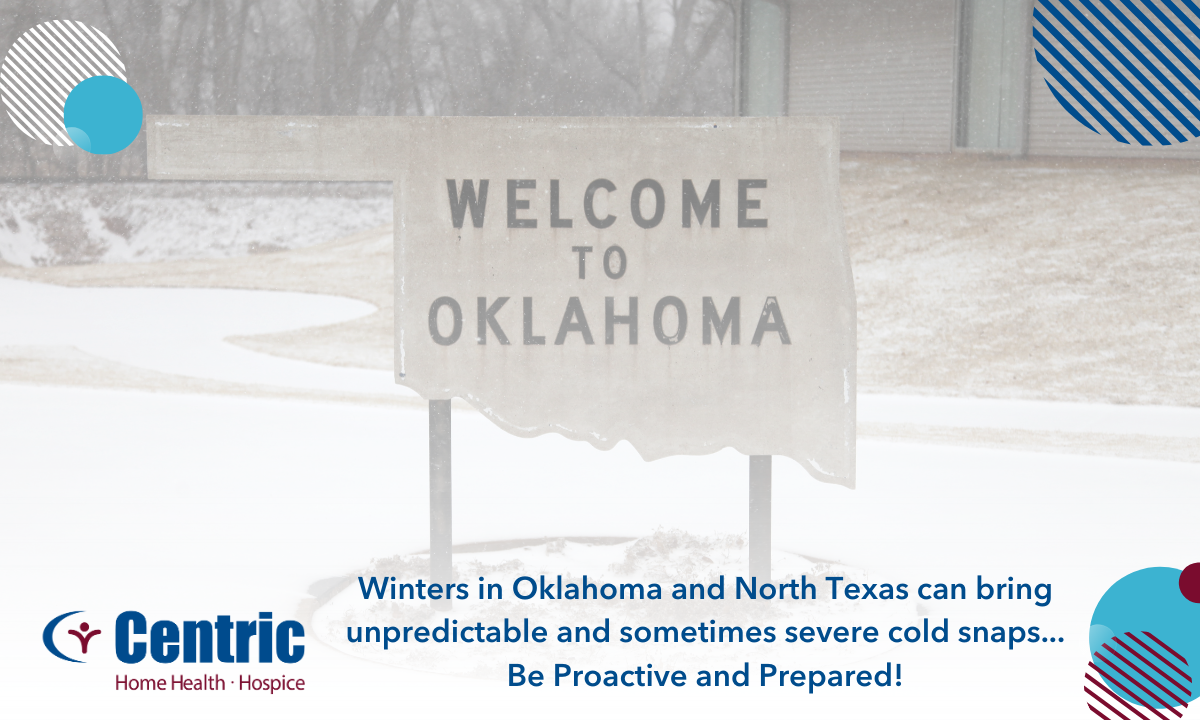Winter Care Tips for Homebound Patients
Staying Safe and Healthy During the Oklahoma and North Texas Winter
Winter can be a challenging time for homebound individuals in Oklahoma and North Texas, bringing increased risks and unique obstacles. While weather predictions point towards a milder winter this year compared to recent years, it's important to remember that Oklahoma and North Texas weather can be unpredictable. Sudden cold snaps, icy storms, and even occasional snowfall can still occur, making it crucial to prepare for any eventuality.
At Centric Home Health and Hospice, we are dedicated to providing compassionate and comprehensive care to our patients, ensuring their well-being throughout the year. With winter's arrival, proactive care becomes even more crucial.
Homebound individuals face heightened risks of falls due to icy conditions and slippery surfaces, making it difficult to maintain independence and increasing the likelihood of injuries. By implementing these practical tips and working closely with our team at Centric Home Health and Hospice, homebound individuals can minimize winter-related risks and enjoy a more comfortable and secure winter season.

Preventing Falls with Home Safety
Staying safe and preventing falls is paramount for homebound individuals, especially during the winter months when icy conditions and slippery surfaces increase the risk of accidents.
Clear Walkways
Maintaining clear walkways is crucial, especially during the winter months in Oklahoma and North Texas. While snowfall is less frequent than in other parts of the country, ice storms and freezing rain can create hazardous conditions. Regularly shovel snow and ice from walkways and steps to prevent slips and falls. For added traction, sprinkle ice melt or sand on slippery surfaces. This proactive approach ensures a safe and accessible path for homebound individuals.
Good Lighting
Proper lighting is essential for safety, both indoors and outdoors. Ensure adequate lighting in all areas of the home, including hallways, stairways, and bathrooms. Install motion-sensor lights outside to illuminate walkways and entrances, especially during nighttime. Good lighting reduces the risk of falls and improves overall mobility.
Secure Rugs
Rugs can pose a tripping hazard, especially for those with limited mobility. To prevent accidents, secure rugs using non-slip mats or double-sided tape. This ensures that rugs remain in place and reduces the risk of slips and falls caused by shifting rugs.
Remove Tripping Hazards
A clutter-free environment is essential for fall prevention. Regularly clear walkways and floors of any obstacles, such as loose cords, toys, or furniture. Store items neatly and avoid leaving objects on the floor where they can be easily tripped over.
Install Grab Bars
Grab bars provide valuable support and can significantly reduce the risk of falls in bathrooms and near the toilet. Install sturdy grab bars in strategic locations, such as next to the toilet, in the shower, and near the bathtub. This added support can make a significant difference in maintaining independence and preventing injuries.
Wear Shoes with Good Traction
Wearing appropriate footwear is crucial for maintaining balance and preventing falls, especially on slippery surfaces. Opt for shoes with good traction, such as those with rubber soles and non-slip treads. These features provide better grip on various surfaces, including wet floors, icy sidewalks, and uneven terrain.
Avoid Wearing Socks on Hard Surfaces
While socks provide warmth and comfort indoors, they can significantly increase the risk of slipping on hard surfaces like tile, hardwood, or linoleum. The lack of friction between socks and smooth floors can lead to unexpected falls. It's best to wear shoes or slippers with soles that provide adequate traction when walking on these surfaces.
Remember, choosing the right footwear and taking precautions to prevent slips and falls can significantly improve safety and mobility, especially for homebound individuals.

Staying Warm with Proper Attire, Home Heating, and Hydration
Staying warm during the winter months is crucial for maintaining overall health and well-being, especially for homebound individuals. Here are some important aspects to consider.
Wear Layers of Warm Clothing, Including Hats, Gloves, and Scarves
Layering clothing is key to staying warm in Oklahoma and North Texas during the winter months. These regions experience fluctuating temperatures, with occasional cold snaps and windy conditions. By wearing multiple layers, you can easily adjust to changing temperatures and maintain a comfortable body temperature. Don't forget to include hats, gloves, and scarves to protect your extremities from the cold, as a significant amount of body heat is lost through these areas.
Choose Wool or Fleece Clothing for Insulation
When selecting clothing for winter wear, prioritize materials with excellent insulating properties. Wool and fleece are excellent choices as they trap warm air close to the body, providing effective insulation against the cold. Consider investing in wool or fleece base layers, sweaters, and socks to maximize warmth and comfort during the colder months in Oklahoma and North Texas.
Wear Warm Socks and Slippers Indoors
Even indoors, it's important to keep your feet warm, especially during cold snaps when temperatures can drop significantly. Wear warm socks and slippers indoors to maintain a comfortable body temperature and prevent cold feet. Opt for materials like wool, fleece, or sherpa for optimal warmth and comfort.
Ensure Proper Home Heating and Check Heating Systems Regularly
In Oklahoma and North Texas, winters can bring unpredictable and sometimes severe cold snaps. Ensuring proper home heating is crucial to stay warm and comfortable during these periods. Regularly inspect and maintain your heating system to ensure it's functioning correctly and efficiently. Schedule professional maintenance before the onset of winter to identify and address any potential issues. If you rely on a fireplace or wood-burning stove, ensure it's properly vented and inspected for safety.
Use Space Heaters Safely and According to Manufacturer Instructions
Space heaters can provide supplemental warmth in specific areas of your home. However, it's crucial to use them safely to avoid fire hazards. Always follow the manufacturer's instructions carefully, and never leave a space heater unattended. Keep flammable materials like curtains, bedding, and furniture at a safe distance from the heater. Consider purchasing a space heater with a tip-over switch that automatically shuts off the unit if it falls over.

Keep the Home Well-Insulated to Prevent Heat Loss
Proper insulation is essential for maintaining a consistent indoor temperature and reducing energy costs. In Oklahoma and North Texas, where winters can be windy and cold, adequate insulation helps prevent heat loss and keeps your home warm. Check your attic and walls for proper insulation levels. Seal any air leaks around windows, doors, and electrical outlets to prevent drafts. Investing in energy-efficient windows and doors can also significantly improve your home's insulation.
Drink Plenty of Fluids to Stay Hydrated, Even in Cold Weather
While you might not feel as thirsty in colder weather, it's crucial to stay hydrated. Dehydration can occur more easily than you think, especially when you're spending time indoors in heated environments. The cold, dry air can also contribute to dehydration. Aim to drink plenty of water and other fluids throughout the day, even if you don't feel particularly thirsty. Warm beverages like herbal tea or broth can also help keep you hydrated and warm.
Avoid Excessive Caffeine and Alcohol, Which Can Dehydrate
While enjoying a warm beverage like coffee or tea can be comforting during the winter months, be mindful of excessive caffeine intake. Caffeine is a diuretic, which means it can increase urine production and lead to dehydration. Similarly, alcohol can also have a dehydrating effect on the body. Limit your intake of caffeinated and alcoholic beverages, and ensure you're drinking plenty of water to counteract their dehydrating effects.
Remember, staying warm, maintaining a comfortable indoor temperature, and staying hydrated during the winter months is crucial for maintaining overall health and well-being in Oklahoma and North Texas. By following these tips and being proactive, you can effectively combat the cold and enjoy a more comfortable winter season.
Managing Medications and Seeking Medical Attention in Winter Months
In Oklahoma and North Texas, winter weather can present challenges to medication management and timely access to healthcare. Many tragedies and emergencies can be avoided if appropriate preparation and proactive planning is in place.
Medications
Proper medication storage is crucial in Oklahoma and North Texas, especially during the winter months when temperatures can fluctuate significantly. Always store medications according to the manufacturer's instructions. Avoid storing medications in extreme temperatures, as this can affect their potency and effectiveness. Always keep medications in their original containers to maintain proper labeling and dosage information. Using a medication organizer can help you track your medications and ensure you are taking them as prescribed.
Appointments
Scheduling doctor's appointments and medication deliveries in advance is essential in Oklahoma and North Texas, where winter weather can bring unpredictable challenges. This proactive approach helps to avoid potential delays caused by inclement weather, such as snowstorms and icy conditions. Having a backup plan for obtaining medications is crucial. Consider contacting your pharmacy for delivery options or exploring alternative sources, such as mail-order pharmacies or home delivery services.
Signs and Symptoms
Be aware of the signs and symptoms of cold-related illnesses, such as hypothermia and frostbite. Monitor for signs of infection, including fever, chills, and persistent cough. If you experience any concerning symptoms, contact your healthcare provider promptly.
Emergency Contacts
Keep emergency contact numbers readily available, including your doctor, local emergency services (911), and a trusted neighbor or family member. It's also important to have a plan for emergency transportation in case of a medical emergency. Consider arranging for transportation services in advance or identifying a reliable individual who can assist you in case of an emergency.
Centric Home Health and Hospice Provides Care 24/7
Centric Home Health and Hospice is dedicated to providing compassionate and comprehensive care to homebound patients in Oklahoma and North Texas during the week, on weekends, and during the holidays. We understand the unique challenges faced by homebound individuals during the winter months and are committed to supporting your well-being. If you have any concerns regarding your health or require assistance with managing your medications or healthcare needs, please don't hesitate to contact our team or your medical provider.
Winter in Oklahoma and North Texas can present unique challenges for homebound individuals. By taking proactive steps to prevent falls, stay warm, manage medications, and seek medical attention when needed, you can navigate the colder months safely and comfortably. Remember, you don't have to face these challenges alone and with proactive planning and preparation, you can navigate these upcoming winter months safely and comfortably. Centric Home Health and Hospice is here (call us at 855.942.3687) to support you with compassionate and comprehensive care. Our team of dedicated professionals can provide assistance with various needs, from medication management to skilled nursing care. Contact us today to learn more about our services and how we can help you stay healthy and independent throughout the winter season.
Share This On Your Favorite App
